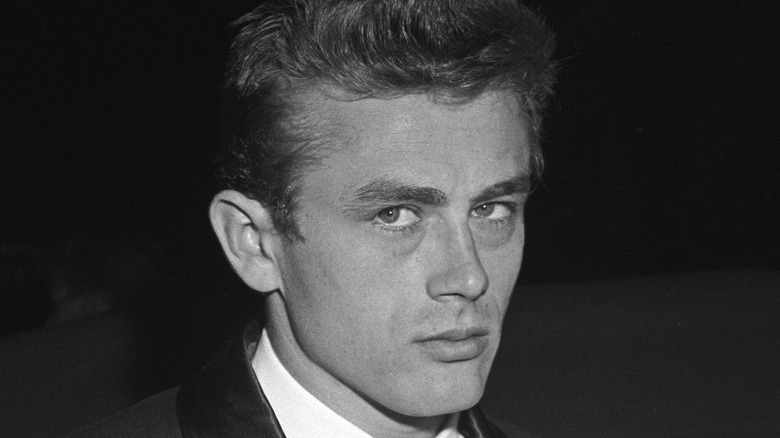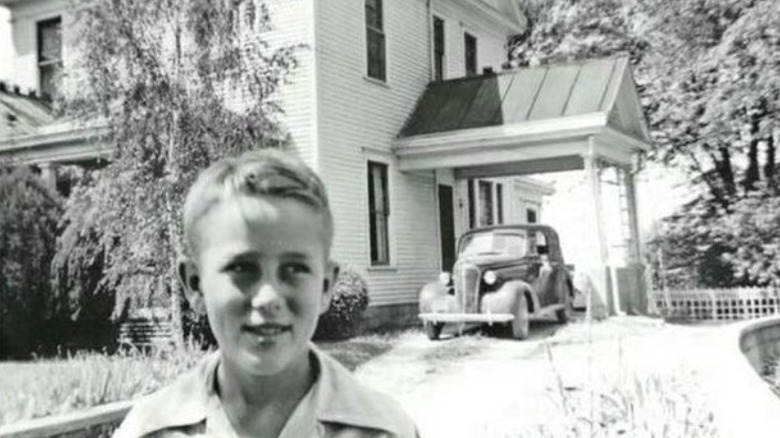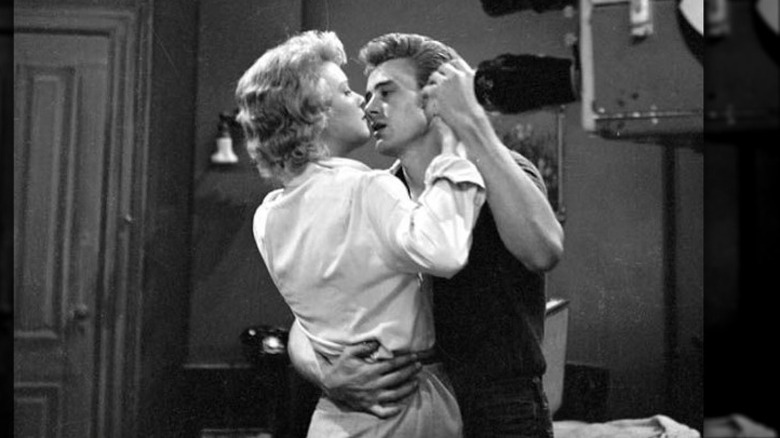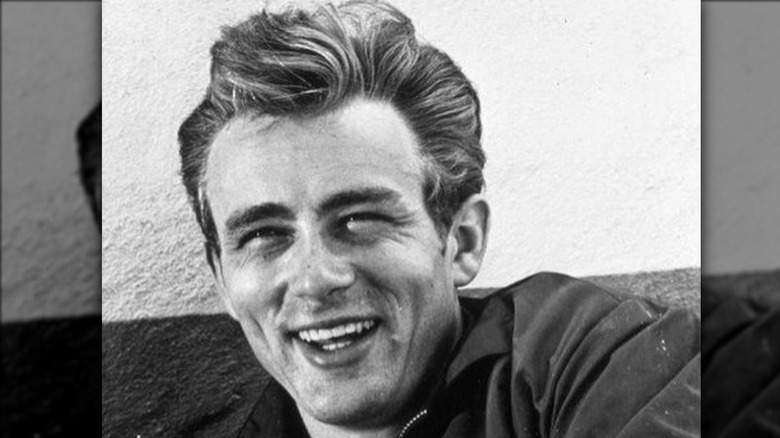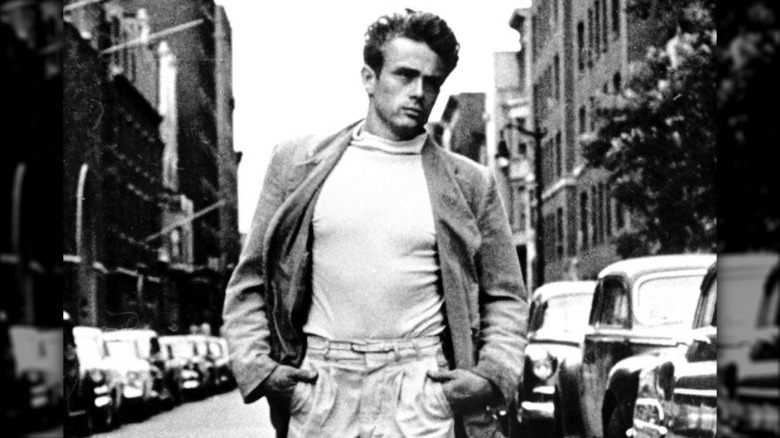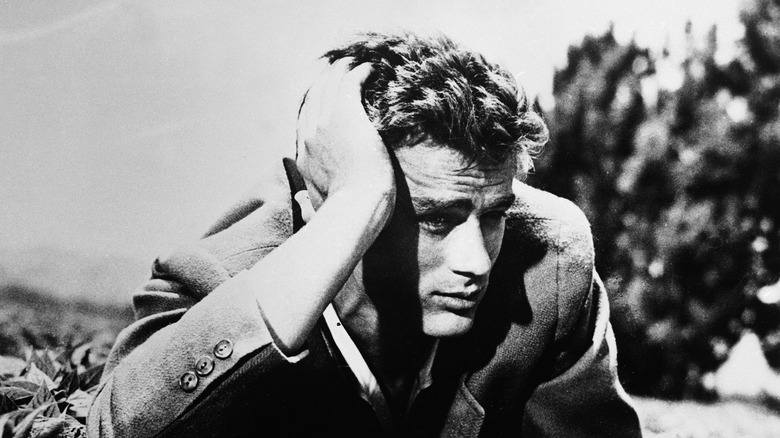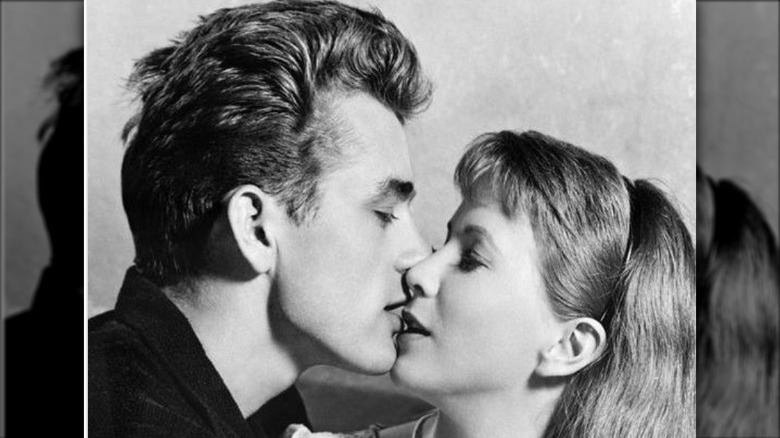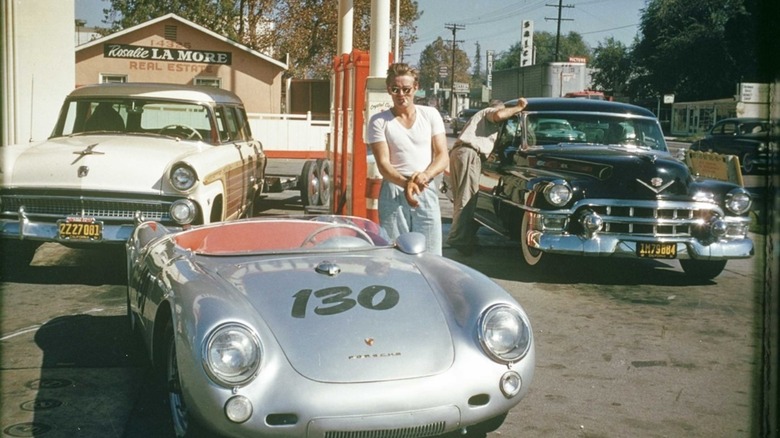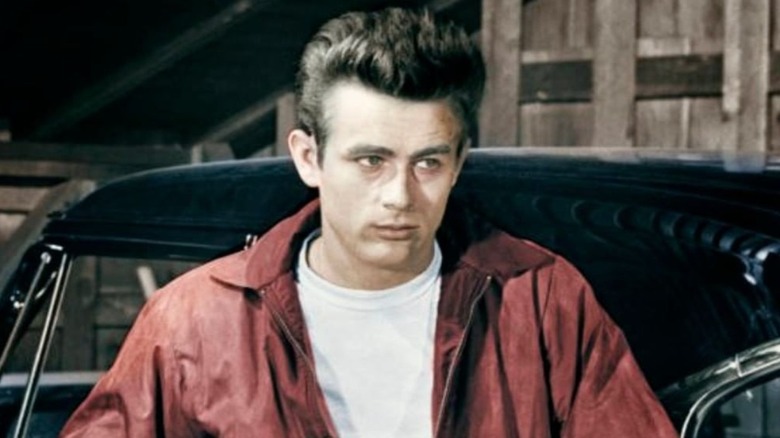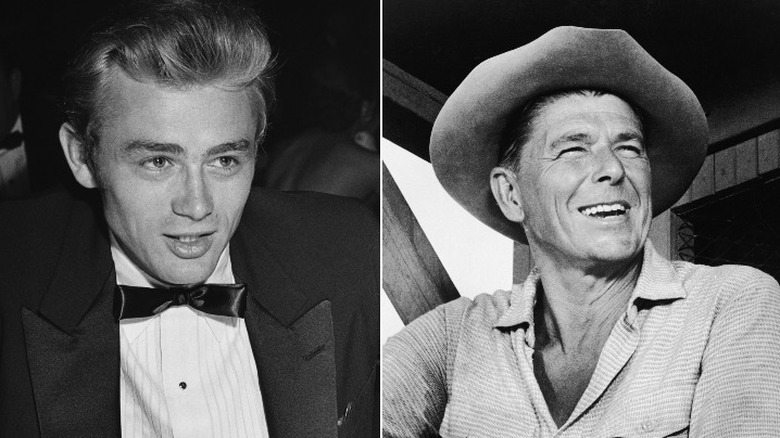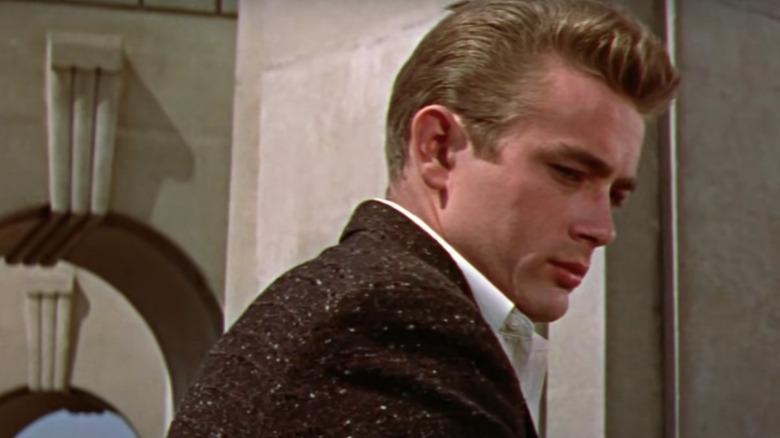What You Didn't Know About James Dean
One can't help but wonder just how much great cinema James Dean would have delivered had he not lost his life in a fatal car crash 67 years ago. The breakout star of "East of Eden" was only 24 when tragedy deprived Hollywood of a groundbreaking talent. With only a trinity of acclaimed motion pictures between 1955 and 1956 in which he appeared as a leading man, Dean sealed his status as not just a film star, but a cultural icon. This, despite the fact that "Dean had no technique," as stated by celebrated filmmaker Elia Kazan, who discovered and directed Dean in his first major role (via Vanity Fair). As Dean was one of the most revered alumni of America's Method acting band, his aptitude was hailed by no less than the father of the craft, Lee Strasberg, who apparently cried watching Dean's final film "Giant" (via Vulture).
Eternalized as cinema's original rebel, on account of his seminal 1955 film "Rebel Without a Cause," Jimmy (as Dean was known) is remembered as much for his reel life as he is for his real one. His two realities fed each other: "To work with him meant exploring his nature, trying to understand it; without this, his powers of expression were frozen," director Nicholas Ray expressed (via Daily Beast). From stories of his curiously complex disposition to the circumstances of his tragic accident, all have contributed to James Dean's legend. Let's take a look back at the life of Hollywood's enigmatic lost star.
After his mother's death, he was packed off to live on a farm
Echoes of James Dean's difficult childhood persisted throughout his troubled youth, resonating in the rebellious image that came to define him. Born in Indiana in 1931, little Jimmy lost his mother to cancer when he was 9, per Biography. His father, who had moved with the family to California, sent the boy back to Indiana to live with relatives on a farm in Fairmount. With his mother gone — "the only person capable of understanding him," per biographer Michael DeAngelis (via PBS) — and his father estranged, Dean lacked a parental figure. A bright student, he fared well in school; in iconic shots for Life magazine, Dean returned to his hometown in 1955 and revisited his school as a guest (via ABC News).
Dean had a provincial upbringing until he was 18, when he pursued a drama course at the University of California, appearing in theatre productions and ultimately earning his television break with a Pepsi commercial (via the 2007 book "James Dean Transfigured"). His early tryst with small-screen work included appearances on series like "Family Theatre" and "Tales of Tomorrow." In 1951, he enrolled at the prestigious Actors Studio and was ultimately discovered by director Elia Kazan, who launched his film career in 1955 with "East of Eden" (via NPR). In his debut lead role of Cal Trask, Dean incidentally portrayed a man desperate for his father's attention.
Director Elia Kazan gave Dean his first role after watching him do theater
Hollywood may have been a far different place than it is today had director Elia Kazan not launched some of the late great names in cinema. Acting giants from Marlon Brando to Eli Wallach to James Dean were all thrust into stardom after Kazan directed them in breakthrough roles (via Britannica). For Dean, who earned his first film credit with "East of Eden" in 1955, Kazan was more than a director. "I was like a father to him or a big brother to him and looked after him," Kazan said in an interview in 1988 (via NPR). His initial introduction to Dean was during the latter's theater days, when, on a friend's recommendation, Kazan went to watch him perform in a play: "And I didn't think much of him," he confessed.
Nevertheless — and luckily for Dean — Kazan took a chance on him. In a letter to John Steinbeck, on whose book the film was based, Kazan said the eccentric young man was "a little bit of a bum, but he's a real good actor" (via The Hollywood Reporter). He further revealed that he had scoured through other potentials — notably Brando and Paul Newman, per Far Out magazine — before finalizing Dean in the lead role of Cal Trask. "East of Eden" was reportedly the only film out of the three he starred in that Dean watched completely before his death in 1955.
James Dean's front teeth were apparently fake
Eyes scrunched, cheeks dimpled, teeth dazzling — James Dean was the boy with the golden smile. Believe it or not, the legend goes that Dean's front teeth were fake. As told in Claudia Springer's book "James Dean Transfigured," the iconic star lost four teeth during a swinging rope accident while growing up in Fairmount, Indiana. To buff up the circumstances of the damage, Dean apparently told people his teeth were knocked out during a motorcycle mishap. As noted by the Belfast Telegraph, Dean wore false teeth all his life — and wasn't averse to suddenly dropping his dentures as a joke, much to the shock of onlookers.
Dean was also short-sighted and couldn't see too well beyond arm's length, therefore was a lifelong wearer of glasses, having gone through a total of 15 pairs during childhood alone (per The Guardian). While he never wore lenses for films, the bespectacled look that Dean sported off-screen contributed to his contemplative, stylish charisma. Banton Frameworks contends that Dean's full-rimmed frames "humanized him."
His iconic Times Square photo was taken before he became a star
The year is 1955. James Dean, oblivious to the precipice of eternal fame he is standing on, is walking through Times Square. The otherwise lively iconic New York neighborhood is empty. It's raining and the 24-year-old lone youth, cigarette dangling from his mouth, looks discomposed. Nobody could have guessed that this picture would become one of the most enduring Hollywood symbols from the 20th century. Taken by photographer Dennis Stock for Life magazine, the picture didn't capture a star: "In this picture, at this moment in his life, the Indiana native is a young, talented, blithely rebellious spirit in the big city, pursuing a dream," per the magazine.
According to Magnum Photos, Dean invited Stock for a viewing of his first big film "East of Eden" after the two met at a party. The film prompted Stock to pitch the idea of a photo essay of Dean as "a young man suspended between two worlds," which would explore his break into stardom. "For Jimmy, it was going home," Stock wrote in the book "Dennis Stock: James Dean" (via Life magazine). The photo series captured Dean in his more candid moments, as he revisited his family farm in Fairmount, read books, got haircuts, and played the bongos. The project, which preceded Dean's untimely death by just a few months, had a poignant quality to it. Per Stock, it was "his way of saying goodbye to the past" (via Independent).
James Dean was the first to win a posthumous Oscar nomination for best actor
Much of the recognition, especially the awards, that extol James Dean's genius came after his time. The actor, who met his fateful end at the young age of 24, graced cinema with just three (highly acclaimed) films before the curtain was brought down on an impending, brilliant career. Two titles — "East of Eden" and "Rebel Without a Cause" — were released in 1955, the year Dean died, while "Giant" came out in 1956. All three films made it to the Oscars, with "East of Eden" and "Giant" getting Dean posthumous nominations for best actor (via the New York Post). His first nomination in 1956 was also the Academy's first official posthumous nomination of any actor in the category. With his second nomination a year later, Dean created history as the actor with the most posthumous Oscar nominations, per the Guinness World Records.
The Academy recognizes Dean for his "raw emotional power" and has named him an enduring figure of "troubled adolescence." Interestingly, "Rebel Without a Cause" — universally considered Dean's foremost work, which gave cinema history the famous red bomber jacket and the haunting, "You're tearing me apart, Lisa" — didn't acquire Dean any Oscar acknowledgment. Meanwhile, both of his co-leads, Natalie Wood and Sal Mineo, won nominations. Dean did make it to the Oscars as a dinner party attendee in March 1955, accompanied by Bond girl Ursula Andress (via ABC News).
Questions still persist about his sexuality
"I'm not a homosexual, but I'm not going through life with one hand tied behind my back," James Dean famously said (via Esquire). Though his sexuality remains clouded in questions, Dean is hailed as a queer icon. His life has continually been appraised on the trail of claims that some of his relationships were homoerotic in nature. The "Giant" star enjoyed a string of Hollywood romances during his youth, the most well-publicized being with Italian actress Pier Angeli, whom he reportedly wanted to marry (via Marie Claire). There were other women — including actress Liz Sheridan, who said she was involved with Dean — but there apparently men, too. William Bast, screenwriter and author of "Surviving James Dean," is understood to have been a friend and lover of the late star, per Esquire.
The late director James Sheldon, talking to The Hollywood Reporter, named director Bob Stevens as one of Dean's partners. Dean's television costar Norma Connolly stated that "he would trade sexual favors to move up the ladder" (via Vulture). His most notorious (alleged) gay relationship is said to have been with his idol and competitor, Marlon Brando. A book published in 2016 claimed the two men shared a fiery relationship that Brando dominated (per Metro). The most enduring statement on Dean's queer legacy is immortalized in his magnum opus, "Rebel Without a Cause," which gave Hollywood its "first gay teenager" in Plato, played by Sal Mineo (via Vanity Fair).
James took a keen interest in racing and bongos
James Dean was the rebel racer of Hollywood. Coupled with his cinematic oeuvre was his notorious taste for speed — a passion that ultimately sealed his tragic end. Dean had a diverse collection of motorcycles and race cars, according to his official website. In fact, the pay from his first role as a leading actor in "East of Eden" went into motor purchases, Esquire notes. The young star got his hands on many sweet rides throughout his short life, the most iconic being the 1955 Porsche 550 Spyder. Also dubbed the "Little Bastard," this was the hot rod in which Dean took his last ever ride on September 30, 1955.
Dean reportedly purchased the vehicle not long before his death and had his racing number 130 painted in bold on its hood, per his official website. He had marked his place as a master driver at multiple races that year, competing against professionals and managing to finish in the top three in at least two races, according to the IndyStar. Per Skoda Motorsport, Dean had intended to stretch the doomed Porsche's legs at a race on October 1.
Far from the racetrack, on the other end of Dean's varied interests, were bongo drums. He had played the instrument since his schooling years in Fairmount, per his official Facebook page. In iconic photographs taken for Life magazine in 1955 (via the Independent), Dean was even pictured playing the bongos for farm animals.
James Dean died before Rebel Without A Cause was released
"Rebel Without a Cause" established James Dean's place in Hollywood legacy as a timelessly youthful, eternally disquieted star. Tragically, he wasn't around to witness that legacy coming to pass. On September 30, 1955, just one month short of the release of what would go on to be regarded as his magnum opus (via Britannica), Dean passed away in an automobile accident. Accompanied by his mechanic, 24-year-old Dean was driving his legendary Porsche 550 Spyder when it collided with another vehicle at an intersection in Cholame, California, the Los Angeles Times reported in 1955. While Dean's passenger survived with injuries, Dean died instantly. The two were traveling from Los Angeles to Salinas, where Dean was to take part in a race. Only a few hours before the fatal crash, Dean was reportedly given a speeding ticket (via Express).
At the time, Dean had appeared in just one motion picture — "East of Eden" — and just a day before his death had wrapped up work on "Giant," which would be his third and final film appearance (via the BBC). In Nicholas Ray's "Rebel Without a Cause," which earned Dean an epithet of a lifetime, he played Jim Stark, a bomber jacket-clad, perennially troubled teen trying to navigate school, family, and identity. Over the years, the film has attained a classic status for its landmark rendering of youth disillusionment and the American zeitgeist as it was in the 1950s (via MTV).
He once acted alongside former US President Ronald Reagan
During his short-lived acting career, James Dean crossed paths with several Hollywood heavyweights — and also with a future president of the United States. Ronald Reagan, who had a film career of almost three decades before he actively stepped into politics (per Britannica), had once shared the screen with Dean. At the time, both men were practical unknowns and were yet to find mainstream success with their respective definitive roles — Jimmy for 1955's "Rebel Without a Cause" and Reagan with the Oscar-nominated 1942 film "Kings Row."
Rare footage found by writer Wayne Federman and shared by The Atlantic in 2010 turned back time to the 20th century, when Jimmy and Reagan were still acting for television. The six-minute clip — retrieved from its original 23-minute broadcast — is from CBS' anthology series "General Electric Theater" that Reagan hosted (via IMDb). Starting in 1953, the show brought different artists on-screen each week for short skits. Dean appeared in an episode titled "The Dark, Dark Hours," which reportedly aired live in 1954. Acting alongside Reagan and actress Constance Ford, Dean — ever the quintessential tormented young man — plays a criminal seeking medical help for a friend. While both Reagan and Dean were proficient actors, Far Out magazine noted that Dean apparently managed to leave his costar confused with his well-known penchant for improvising dialogue.
James Dean loved to improvise
With or without a cause, James Dean truly was a rebel. Over a short span of just three films, he enthralled audiences with a brooding temperament that became definitive of 20th-century youth angst. But beyond the sexy cigarette balancing act was an innately gifted actor, who was spunky enough to deliver his own lines on screen. Dean loved to ad-lib, much to the chagrin of his fellow actors: "Just make him say the lines as they're written," one of them once said, per Far Out magazine. Dean, like his worthy contemporary Marlon Brando, was a protégé of the Method school of acting, which promoted a "naturalistic" style of acting that drew from the self (via the New York Post).
In "East of Eden," for instance, director Elia Kazan apparently pushed Dean to delve into his own difficult experiences with his father to add color to his character of Cal Trask (via PBS). Even as his costars complained, Kazan told Dean to "keep it up." As noted by the Gentleman's Gazette, a particularly emotional scene in the film, when Cal hugs his father, was totally improvised by Dean. For all the naturalness with which he went off-script, Dean in real life was so notoriously thin-skinned that a single piece of feedback from Method guru Lee Strasberg had left him shaken (per Vulture). Ultimately, though, a lot of Dean's technique relied on spontaneity, and he was indisputably a master of his craft.
